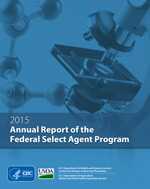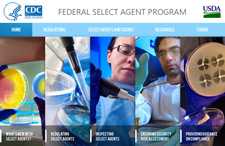Division of Select Agents and Toxins: About the Federal Select Agent Program
History of the Federal Select Agent Program
In response to the 2001 U.S. anthrax attacks and as part of the Public Health Security and Bioterrorism Preparedness and Response Act of 2002 (the “Bioterrorism Act”), Congress sought to increase the security and oversight of select agents and toxins by creating a regulatory organization that would have the authority to create and enforce regulations that dictate who, how, and where select agents and toxins could be possessed, used, and transferred.
The result was the Federal Select Agent Program (FSAP), which is managed jointly by CDC and USDA’s Animal and Plant Health Inspection Service (APHIS)/Agriculture Select Agent Services (AgSAS). CDC provides oversight for the select agents and toxins that cause diseases in people, and APHIS provides oversight for select agents and toxins that cause diseases in animals and plants. CDC and APHIS share the responsibility for agents that threaten both humans and animals, such as anthrax. FSAP also works closely with the Federal Bureau of Investigation/Criminal Justice Information Services Division to conduct security background checks of employees who access select agents or toxins. Learn more about the history of FSAP.
Progress of the Federal Select Agent Program
Today, FSAP oversees nearly 300 organizations that are registered to possess, use or transfer select agents and toxins. These organizations range from university and government laboratories to private and commercial organizations.
The research conducted on select agents and toxins provides important scientific discoveries that have led to improved surveillance, prevention, diagnostics and treatment options for diseases and toxins considered to be the most threatening to people’s health. While some of the diseases and toxins considered to be select agents and toxins are not inherently dangerous in their natural form, many of these organisms, if manipulated or released in large quantities, can cause serious health threats to humans or agriculture. By balancing the importance of the research being done and the risk of working with select agents and toxins, FSAP helps make it possible to conduct this vital research critical to national security in a safe and secure manner. Learn more about FSAP progress.
CDC and the Federal Select Agent Program
Within CDC the Division of Select Agents and Toxins, housed within the Office of Emergency Preparedness and Response, took on the responsibility of facilitating CDC’s role in FSAP. The division oversees both the CDC arm of FSAP as well as CDC’s Import Permit Program, which regulates the importation of infectious biological agents, infectious substances, and vectors of human disease into the United States.
CDC, through the division, has conducted more than 2,000 inspections of organizations registered with the Federal Select Agent Program. This milestone marks a continued commitment to our nation’s defense against naturally occurring disease and bioterrorism. Updates on program improvement efforts related to CDC’s role in the FSAP can be found here.
2015 Annual Report
Federal Select Agent Program
- Page last reviewed: June 30, 2016
- Page last updated: June 30, 2016
- Content source:


 ShareCompartir
ShareCompartir

